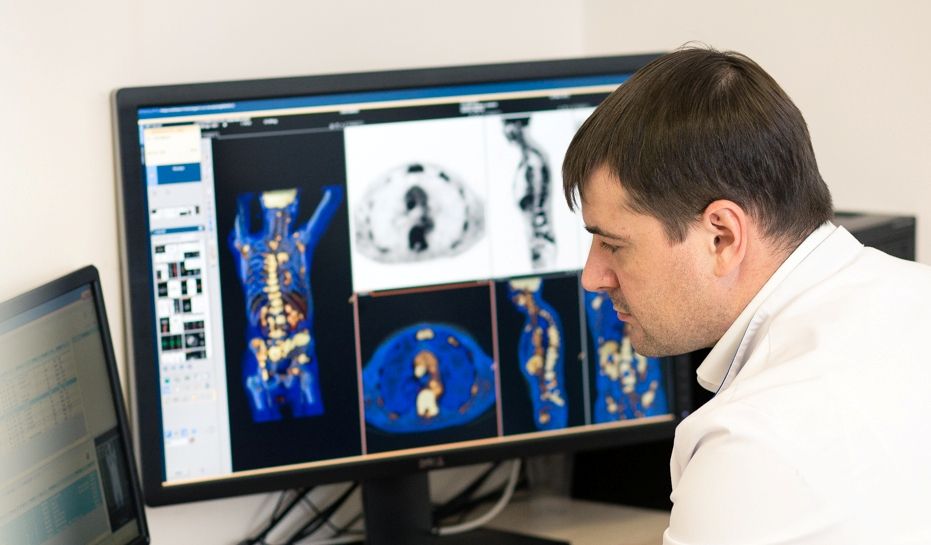Diagnosis of oncological diseases
Early diagnosis (screening)
Effective diagnostics in a short time
Cancer stage diagnosis or treatment response control
The EMC Institute of Oncology has all modern facilities for conducting diagnostic studies in order to:
-
detection of malignant tumors at an early stage,
-
determination of the stage of spread of malignant tumors,
-
evaluation of the effectiveness of the treatment.
Each stage is extremely important for treatment planning and plays a key role in the course of treatment.
The EMC Institute of Oncology conducts the full range of modern diagnostic studies, including radiation diagnostics (ultrasound, CT, MRI), radionuclide diagnostics (PET, SPECT), endoscopic and laboratory diagnostics (clinical, genetic and histological studies).
Early diagnosis (screening)
The capabilities of modern medicine make it possible to successfully treat oncological diseases detected at an early stage of their development. In more than 95% of cases, cancer detected at an early stage is curable.
According to international protocols, the EMC Institute of Oncology has developed cancer screening programs, as well as comprehensive cancer diagnostic programs (Onco check-up), which can detect not only malignant neoplasms at an early stage of their development, but also precancerous diseases.
Effective diagnostics in a short time
The EMC Institute of Oncology can perform a full range of diagnostic tests in 1 day: CT, MRI, PET-CT, biopsies under the control of ultrasound, CT, MRI. The diagnosis is carried out according to international protocols by highly qualified specialists with experience in the USA and Western Europe.
The EMC has its own histological laboratory, equipped with the most modern equipment. Laboratory specialists, leading pathomorphologists, histologists from Russia and France, have the latest methods of analyzing the obtained material. The verification of the histological diagnosis is carried out in leading clinics in Europe, Israel and the USA.
Cancer stage diagnosis or treatment response control
With the advent of PET diagnostics, a new era has begun in terms of the accuracy of establishing a malignant diagnosis and monitoring the course of the disease and the course of treatment. Despite the fact that diagnostic methods such as CT and MRI are quite informative, they allow us to judge changes in the size of the tumor to a greater extent. A clear assessment of metabolism, that is, the metabolism of education, and its response to treatment is possible only with PET.
The EMC Institute of Oncology Radionuclide Diagnostics Center conducts a wide range of research PET-CT and SPECT-CT. PET-CT is an indispensable method in oncology that allows assessing the prevalence of the disease, the presence of metastases, and monitoring the effectiveness of treatment. A wide range of SPECT-CT studies include scintigraphy of the sentinel lymph node (the first in the path of lymph outflow) in breast cancer, skin melanoma, and some other diseases. The research is carried out according to European protocols using high-quality radiopharmaceuticals produced in our own laboratory and passed quality control in accordance with international standards.
Make an appointment for a consultation and we will contact you for more details
Why the EMC
The first and only clinic in Russia, created in the image of the world's leading clinics
EMC is a multidisciplinary center offering patients a high level of medical services and a personalized approach
600
world-renowned doctors
57
treatment directions
36
years take care of your health
24/7
we work at any convenient time
Worldwide recognition and awards
Our achievements have been confirmed by prestigious international awards
 Learn more
Learn more
Worldwide recognition and awards
We work according to international standards, we have licenses and certificates
 Certificates and licenses
Certificates and licenses
Make an appointment for a consultation
Specify your contacts and we will contact you to clarify the details
Reviews
Anonymous,
City: -
Super nice
Same as 1st visit Welcome and Secretary were super nice Doctor Abdulin
was great and super pro.
Clinic:
Institute of Oncology
Doctor:
Iskander Abdullin
3 July 2025
Anonymous user Name,
City: -
I wish you all good health and professional success
Many thanks to the doctors Moskalets E. R. and Penkova O. V., who described
my pictures on the day of the study, as well as to the staff of the PET CT department Nikolay, nurse Ekaterina, laboratory assistants Eduard and Nikolay, who were with me from the beginning and until the
end of the study, we worked in a coordinated, professional and friendly manner.
... more
Clinic:
Institute of Oncology
Doctor:
Elina Moskalets
26 March 2025
Konstantin Vladimirovich,
City: -
I express my gratitude for the treatment!
He came back with severe pain in the neck. The diagnosis revealed an intervertebral
hernia. The very next day, the operation was carried out, everything was very fast. After the operation, he was surrounded by nurses. I would especially like to express my gratitude to:
Krivoshapkin Alexey Leonidovich, Yulia Markina, Vladimir Klimov, Orkhan Abdullayev, Gleb Sergeevich Sergeev, and Alexander Loginov.
... more
Clinic:
Institute of Oncology , Neurosurgery Clinic
Doctor:
Krivoshapkin Alexey
16 March 2025
Anonymous user Name,
City: -
We thank all the staff of the clinic for saving our lives
We thank Alexey Leonidovich Krivoshapkin, Alexey Sergeevich Gaitan, Orkhan
Abdullayev and all the clinic staff for saving our lives.
Clinic:
Institute of Oncology , Neurosurgery Clinic
Doctor:
Krivoshapkin Alexey
7 March 2025
Anonymous user Name,
City: -
Endless gratitude
Endless thanks to my dear Dr. Pavel Koposov.
Clinic:
Institute of Oncology
Doctor:
Pavel Koposov
4 March 2025
Vladimir,
City: Yessentuki
About surgeon Ruchkin D. V.
Dmitry Ruchkin is the epitome of the highest professionalism , dedication,
modesty and dedication to his work. His method of gastroectomy is unique, allowing you to eat and live a full life after a complex operation. A low bow to him and the surgeon Jan to Maria Nikolaevna —
members of his team.
... more
Clinic:
Institute of Oncology
Doctor:
Dmitry Ruchkin
12 February 2025
Anonymous user Name,
City: -
Thank you to all the clinic staff!!!
All employees throughout the chain from reception to the end of the procedure
were very kind and attentive. I would like to express my gratitude to all of you, and I would like to especially mention doctor Ilya E. Loiko for his kind words and wishes. Thank you to all the clinic
staff!!!
... more
Clinic:
Institute of Oncology
Doctor:
Ilya Loyko
24 January 2025
S. V. Firmanov,
City: -
Gratitude from the patient
Many thanks to all the staff of the clinic, especially Pavel Koposov.
Clinic:
Institute of Oncology
Doctor:
Pavel Koposov
16 January 2025
Anonymous user Name,
City: -
Many thanks to the professional in his field
Thank you to the team of the Center for Radionuclide Diagnostics for their
well-coordinated, productive work and good mood during the preparation and conduct of the study. And, of course, a huge thank you to the professional in his field, Dr. Borzyanitsa. Happy New Year Happy New
year to the entire EMC team!
... more
Clinic:
Institute of Oncology
Doctor:
Stanislav Borzyanitsa
25 December 2024
Anonymous user Name,
City: -
Gratitude
Sincere thanks to Dr. Vasilyeva.
Clinic:
Institute of Oncology
Doctor:
Irina Vasilieva
12 December 2024
Anonymous user Name,
City: -
Thank you all very much from me and my family
Many thanks and best wishes from the bottom of my heart: Zhao V. A., Yuldashev
A. G., Vakhabova Yu. V., Zhizhko N. V. specialists from GOD. The medical staff is beyond praise.
Clinic:
Institute of Oncology
Doctor:
Anvar Iuldashev
12 December 2024
Anonymous user Name,
City: -
Thank you very much
Many thanks to Iskander Abdullin, the staff of the Center for Radiation
Diagnostics.
Clinic:
Institute of Oncology
Doctor:
Iskander Abdullin
11 December 2024
Anonymous user Name,
City: -
You can trust such professionals
The most important thing is care and tact at all stages of visiting the
clinic and, as a conclusion, professionalism of the highest level Dr. Irina Vasilyeva, who surprisingly combines knowledge, skills, experience, and sensitivity and empathy.
Clinic:
Institute of Oncology , Breast Clinic
Doctor:
Irina Vasilieva
9 December 2024
Anonymous user Name,
City: -
Gratitude to the doctor
Thanks to the doctor Vakhabova Julia Vyacheslavovna, she blessed me for
6 months...
Clinic:
Institute of Oncology
Doctor:
Yuliya Vakhabova
28 November 2024
Anonymous user Name,
City: -
I express my deep gratitude to the specialists of the highest class
I would like to express my deep gratitude to the top-class specialists,
Professor Yevgeny Libson, Director of the Cancer Center Salim Nidal, and Ilya Yevgenyevich Loiko for my essentially "salvation", for the extremely kind and sincere attitude.
Clinic:
Institute of Oncology
Doctor:
Evgeniy Libson (Israel)
26 November 2024
Anonymous user Name,
City: -
I got ALL my questions answered
I was at the consultation of Professor Vsevolod Borisovich Matveev... I
got ALL my questions answered... And even more...In a word-not a man, but a HUMAN BEING...!!! The staff is friendly, answers all questions, helps, etc... People with health problems come in...They all have no
time for this or that...Employees understand all this and make their stay in the clinic as comfortable as possible...
... more
Clinic:
Institute of Oncology , Urology Clinic
Doctor:
Vsevolod Matveev
22 November 2024
Popov Khariton,
City: -
Thank you very much
Many thanks to Iskander Abdullin, Alexey Krivoshapkin, Natalia Zharinova,
Elmira Sultanova, Alla Artamonova and all the staff of the clinic who helped me and my children.
Clinic:
Institute of Oncology
Doctor:
Iskander Abdullin
20 November 2024
Anonymous user Name,
City: -
Words of gratitude to A. L. Krivoshapkin
Special thanks to Professor A. L. Krivoshapkin for the online consultation.
And I want to thank the girl operator who helped me with installing the app for the conference.
Clinic:
Institute of Oncology , Neurosurgery Clinic
Doctor:
Krivoshapkin Alexey
31 October 2024
Anonymous user Name,
City: -
Thanks!
The EMS clinic was contacted on the recommendation of a friend of my husband.
Thank you for your cordiality, care, and attention from the first visit to the clinic, starting with the staff meeting in the lobby, reception, and further support throughout the entire examination,
treatment options.I would like to thank the Oncology department , my attending physician Stanislav Borzyanitsa (for his attention, care, cordiality, support during treatment...)I would like to thank DIO Salim Nidal, the staff, the staff of the Radiotherapy Center, Radionuclide Diagnostics, performing a biopsy, the Staff of the Hospital and Laboratory...Thanks!
... more
Clinic:
Institute of Oncology
Doctor:
Salim Nidal (Israel)
30 October 2024
Anonymous user Name,
City: -
Sincerely grateful
I am sincerely grateful to Dr. Salim Nidal, Dr. Libson, Dr. Anatoly Olegovich,
Valyusha and others, as well as to the girls at the reception and the entire radiotherapy team. Thank you very much for your professional, attentive and warm attitude. Strength to you and health!May God
grant that we will work for many more years and bring JOY to people!
... more
Clinic:
Institute of Oncology
Doctor:
Salim Nidal (Israel)
29 October 2024




.webp)















